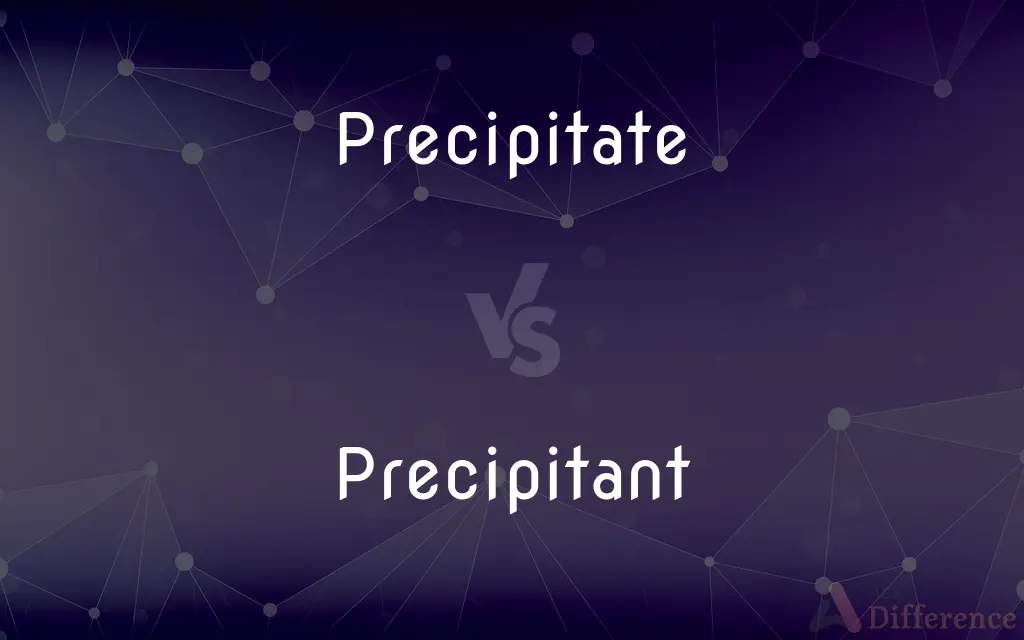Precipitate vs. Precipitant — What's the Difference?
By Tayyaba Rehman & Maham Liaqat — Updated on April 3, 2024
Precipitate as a noun refers to the solid substance formed in a solution, while as a verb, it means to cause an event or substance to happen suddenly. Precipitant, as an adjective, describes something causing precipitation, and as a noun.

Difference Between Precipitate and Precipitant
Table of Contents
ADVERTISEMENT
Key Differences
When used as a noun, "precipitate" refers to the solid particles that are formed by the chemical reaction occurring in a solution. This is often seen in chemistry when a reaction causes a solid to form and separate from a liquid mixture. On the other hand, as an adjective, "precipitant" describes an agent or condition that causes a substance to precipitate out of a solution. Thus, while "precipitate" refers to the outcome of a chemical process, "precipitant" refers to the cause of that outcome.
As a verb, "to precipitate" means to cause something to happen rapidly or suddenly. This can apply to both physical and abstract contexts, such as precipitating a chemical reaction or precipitating an event or decision. The noun form of "precipitant," however, specifically refers to a substance that causes another substance to precipitate. This highlights the distinction between the broader, more abstract use of "precipitate" and the specific, chemical-oriented use of "precipitant."
The term "precipitate" can also imply haste or rashness in a non-chemical context, suggesting actions taken without careful consideration. In contrast, "precipitant" in its adjective form does not carry this connotation but strictly relates to the capability to cause precipitation. This linguistic nuance distinguishes "precipitate" as having both a physical and metaphorical application, whereas "precipitant" is primarily used in technical, particularly chemical, contexts.
While "precipitate" can function as a noun, verb, or adjective, "precipitant" is used as a noun and adjective with a specific focus on the action of causing precipitation. This functional difference underscores the versatility of "precipitate" in language, capable of describing both the act and the effect, compared to "precipitant," which is primarily concerned with the causative role in chemical processes.
In practical application, a chemist might use "precipitant" to describe a substance added to a solution to create a "precipitate," illustrating the cause-and-effect relationship inherent in these terms. This distinction is critical in scientific writing and communication, where precision and clarity are paramount.
ADVERTISEMENT
Comparison Chart
Part of Speech
Noun, verb, adjective
Noun, adjective
Definition (Noun)
A solid substance formed in a solution.
A substance causing another to precipitate.
Use as Verb
To cause to happen suddenly or hastily.
Not applicable
Use as Adjective
Describing something happening suddenly or with haste.
Describing something causing precipitation.
Context of Use
Chemical reactions, abrupt events/actions.
Chemical processes.
Connotation
Can imply hastiness (non-chemical use).
Technically focused, without implication of hastiness.
Example (Noun)
The reaction produced a white precipitate.
The addition of the precipitant caused a reaction.
Compare with Definitions
Precipitate
Acting with excessive haste or impulse.
A precipitate decision led to unforeseen consequences.
Precipitant
A substance that causes another substance to precipitate.
The chemist added a precipitant to the solution.
Precipitate
To cause an event to happen suddenly or unexpectedly.
His resignation precipitated a company-wide reorganization.
Precipitant
Causing precipitation.
The precipitant action of the chemical was crucial for the separation process.
Precipitate
To hasten the occurrence of something.
The scandal precipitated the government's fall.
Precipitant
An agent inducing precipitation.
Finding an effective precipitant was key to the experiment's success.
Precipitate
To cause to happen, especially suddenly or prematurely
An announcement that precipitated a political crisis.
Precipitant
Rushing or falling headlong.
Precipitate
To cause to fall down from a height; hurl downward
"The finest bridge in all Peru broke and precipitated five travelers into the gulf below" (Thornton Wilder).
Precipitant
Acting with or marked by impulsiveness in thought or action; rash. See Usage Note at precipitate.
Precipitate
To put suddenly into a certain state or condition
"He was like a man who had never known liberty and was all at once precipitated into it" (Taylor Caldwell).
Precipitant
Abrupt or unexpected; sudden.
Precipitate
(Meteorology) To cause (a form of water, as rain or snow) to fall from the air.
Precipitant
A substance that causes a precipitate to form when it is added to a solution.
Precipitate
(Chemistry) To cause (a solid substance) to be separated from a solution.
Precipitant
That falls headlong, or causes a headlong fall.
Precipitate
(Meteorology) To fall from the air as a form of water, such as rain or snow.
Precipitant
Rash or impulsive.
Precipitate
(Chemistry) To be separated from a solution as a solid.
Precipitant
Sudden or unexpected.
Precipitate
Moving rapidly and heedlessly; speeding headlong.
Precipitant
(chemistry) That causes precipitation.
Precipitate
Acting with or marked by excessive haste and lack of due deliberation.
Precipitant
A substance that forms a precipitate when added to a solution.
Precipitate
Occurring suddenly or unexpectedly.
Precipitant
Falling or rushing headlong; rushing swiftly, violently, or recklessly; moving precipitately.
They leave their little livesAbove the clouds, precipitant to earth.
Should he return, that troop so blithe and bold,Precipitant in fear would wing their flight.
Precipitate
(Chemistry) A solid or solid phase separated from a solution.
Precipitant
Unexpectedly or foolishly brought on or hastened; rashly hurried; hasty; sudden; reckless.
Precipitate
A product resulting from a process, event, or course of action.
Precipitant
Any force or reagent which causes the formation of a precipitate.
Precipitate
(transitive) To make something happen suddenly and quickly.
To precipitate a journey, or a conflict
It precipitated their success
Precipitant
An agent that causes a precipitate to form
Precipitate
(transitive) To throw an object or person from a great height.
Precipitant
Done with very great haste and without due deliberation;
Hasty marriage seldom proveth well
Hasty makeshifts take the place of planning
Rejected what was regarded as an overhasty plan for reconversion
Wondered whether they had been rather precipitate in deposing the king
Precipitate
(transitive) To send violently into a certain state or condition.
We were precipitated into a conflict
Precipitate
To come out of a liquid solution into solid form.
Adding the acid will cause the salt to precipitate.
Precipitate
To separate a substance out of a liquid solution into solid form.
Precipitate
To have water in the air fall to the ground, for example as rain, snow, sleet, or hail; be deposited as condensed droplets.
It will precipitate tomorrow, but we don't know whether as rain or snow.
Precipitate
(transitive) To cause (water in the air) to condense or fall to the ground.
Precipitate
(intransitive) To fall headlong.
Precipitate
(intransitive) To act too hastily; to be precipitous.
Precipitate
Headlong; falling steeply or vertically.
Precipitate
Very steep; precipitous.
Precipitate
With a hasty impulse; hurried; headstrong.
Precipitate
Moving with excessive speed or haste; overly hasty.
The king was too precipitate in declaring war.
A precipitate case of disease
Precipitate
Performed very rapidly or abruptly.
Precipitate
A product resulting from a process, event, or course of action
Precipitate
(chemistry) a solid that exits the liquid phase of a solution
Precipitate
Overhasty; rash; as, the king was too precipitate in declaring war.
Precipitate
Lacking due deliberation or care; hurried; said or done before the time; as, a precipitate measure.
Precipitate
Falling, flowing, or rushing, with steep descent; headlong.
Precipitate the furious torrent flows.
Precipitate
Ending quickly in death; brief and fatal; as, a precipitate case of disease.
Precipitate
An insoluble substance separated from a solution in a concrete state by the action of some reagent added to the solution, or of some force, such as heat or cold. The precipitate may fall to the bottom (whence the name), may be diffused through the solution, or may float at or near the surface.
Precipitate
Atmospheric moisture condensed as rain or snow, etc.; same as precipitation{5}.
Precipitate
To throw headlong; to cast down from a precipice or height.
She and her horse had been precipitated to the pebbled region of the river.
Precipitate
To urge or press on with eager haste or violence; to cause to happen, or come to a crisis, suddenly or too soon; as, precipitate a journey, or a conflict.
Back to his sight precipitates her steps.
If they be daring, it may precipitate their designs, and prove dangerous.
Precipitate
To separate from a solution, or other medium, in the form of a precipitate; as, water precipitates camphor when in solution with alcohol.
The light vapor of the preceding evening had been precipitated by the cold.
Precipitate
To dash or fall headlong.
So many fathom down precipitating.
Precipitate
To hasten without preparation.
Precipitate
A precipitated solid substance in suspension or after settling or filtering
Precipitate
Separate as a fine suspension of solid particles
Precipitate
Bring about abruptly;
The crisis precipitated by Russia's revolution
Precipitate
Fall from clouds;
Rain, snow and sleet were falling
Vesuvius precipitated its fiery, destructive rage on Herculaneum
Precipitate
Fall vertically, sharply, or headlong;
Our economy precipitated into complete ruin
Precipitate
Hurl or throw violently;
The bridge broke and precipitated the train into the river below
Precipitate
Done with very great haste and without due deliberation;
Hasty marriage seldom proveth well
Hasty makeshifts take the place of planning
Rejected what was regarded as an overhasty plan for reconversion
Wondered whether they had been rather precipitate in deposing the king
Common Curiosities
Is precipitant always a chemical?
In its noun form, yes, a precipitant refers to a chemical substance that causes precipitation. As an adjective, it describes anything causing precipitation.
How can one differentiate between precipitate and precipitant in a sentence?
"Precipitate" is used when referring to the solid product or the act of causing something suddenly. "Precipitant" refers to the substance or factor that causes the precipitation.
Can precipitate be used to describe non-chemical reactions?
Yes, "precipitate" can also describe sudden or unexpected events or decisions in non-chemical contexts.
Can the term precipitate have negative connotations?
As an adjective or verb, it might imply rashness or suddenness that could have negative outcomes, unlike "precipitant," which is neutral and technical.
What causes a precipitate to form?
A precipitate forms when a precipitant, a chemical substance, is added to a solution, causing a solid to separate from the liquid.
Can something be both a precipitate and a precipitant?
In different contexts or reactions, yes. A substance might be a precipitate in one reaction and act as a precipitant in another.
How do precipitate and precipitant relate in chemistry?
They represent the cause-and-effect relationship in precipitation reactions, with the precipitant causing the formation of the precipitate.
Is it correct to use precipitate when describing quick decisions?
Yes, "precipitate" can describe decisions made quickly and without sufficient thought, highlighting its versatility beyond scientific usage.
How important is the distinction between precipitate and precipitant in scientific communication?
It's very important for clarity and precision, especially in written and oral explanations of chemical processes.
Does the meaning of precipitant change in different scientific fields?
While its core meaning remains tied to causing precipitation, the specific nature of the "precipitation" could vary slightly depending on the field.
Share Your Discovery

Previous Comparison
Penumbra vs. Umbra
Next Comparison
Manner vs. DemeanorAuthor Spotlight
Written by
Tayyaba RehmanTayyaba Rehman is a distinguished writer, currently serving as a primary contributor to askdifference.com. As a researcher in semantics and etymology, Tayyaba's passion for the complexity of languages and their distinctions has found a perfect home on the platform. Tayyaba delves into the intricacies of language, distinguishing between commonly confused words and phrases, thereby providing clarity for readers worldwide.
Co-written by
Maham Liaqat












































